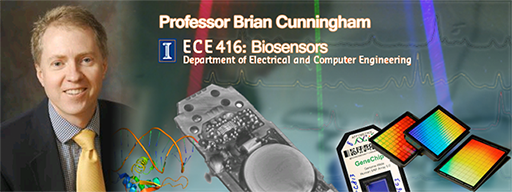
With over 5,000 resources including simulation tools, teaching materials, presentations, and online courses, nanoHUB has been utilized by thousands of students around the world. While nanoHUB is beneficial to users interested in learning new concepts or refreshing existing knowledge, we wanted to highlight the benefits it offers to content/resource contributors.
We interviewed Dr. Brian Cunningham, Professor of Electrical and Computer Engineering at the University of Urbana-Champaign, about the resources he has published on nanoHUB.org. One of his resources, a biosensors course, has been utilized by over 20,000 users globally. Dr. Cunningham taught the course on-campus for eight years before publishing it on nanoHUB in 2013. Since then, students from numerous disciplines such as chemistry, food science, crop science, physics, electrical engineering, and bioengineering have viewed his lectures on nanoHUB.
Dr. Cunningham believes nanoHUB is useful in many ways. By making his material accessible to anyone with an internet connection he can have an impact on students and education. He also utilizes nanoHUB as a “back up plan” for his own students that may have missed his lectures due to job interviews or illness.
“As a professor, you really hope to make an impact on students and education. It would take hundreds of years to teach that many students.”
Dr. Cunningham plans to use nanoHUB tools in conjunction with his course to help students better understand nanoscience concepts.
“Computer simulations are very good when it comes to teaching bio-sensing principles. The next time I teach this class, I will have the students use nanoHUB tools for plasma and metal nanoparticles simulations.”
ABOUT THE COURSE
Learn the underlying engineering principles used to detect small molecules, DNA, proteins, and cells in the context of applications in diagnostic testing, pharmaceutical research, and environmental monitoring. Biosensor approaches including electrochemistry, fluorescence, acoustics, and optics will be taught. The course also teaches aspects of selective surface chemistry, including methods for biomolecule attachment to transducer surfaces. Students will learn how biosensor performance is characterized and will analyze case studies of commercial biosensor systems. Blood glucose detection, fluorescent DNA microarrays, label-free biochips, and bead-based assay methods will be covered. The course teaches classical methods for biodetection, but also extends into current areas of research and novel sensors involving nanotechnology, photonic crystals, and new tools used in the fields of genomics and proteomics.
Applications are now being accepted for the Network for Computational Nanotechnology NCN SURF program. This opportunity is available to rising seniors in U.S. universities (and both juniors and seniors who are at Purdue University).
Review the program description and access the application link at the NCN SURF page.
Be sure to click on the Undergraduate Research link at the top of the page to view the available projects. Please state in your application which project you are applying for along with your qualifications.
Applications will be accepted until March 10th, 2016.









